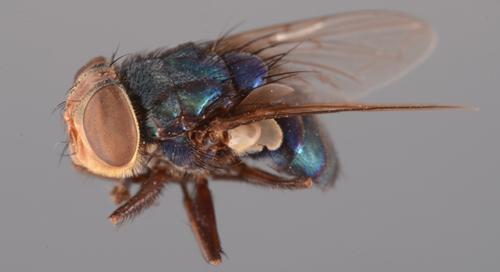The fearsome screwworm is back. Federal officials have identified a small outbreak of the insect, also known as the New World screwworm fly (Cochliomyia hominivorax), in a population of deer and possibly some pets in Big Pine Key, Florida.
 The United States Department of Agriculture’s Animal and Plant Health Inspection Service confirmed that the pest has infected at least three and likely many more key deer, an endangered species that only lives on Big Pine Key and nearby islands. Local companion animals also show signs of infection, the Florida Department of Agriculture and Consumer Services noted in a press release on October 3.
The United States Department of Agriculture’s Animal and Plant Health Inspection Service confirmed that the pest has infected at least three and likely many more key deer, an endangered species that only lives on Big Pine Key and nearby islands. Local companion animals also show signs of infection, the Florida Department of Agriculture and Consumer Services noted in a press release on October 3.
In response, the state’s commission of agriculture, Adam Putnam, declared an “agricultural emergency” in Monroe County, and ordered that no animals be removed from the area. An unspecified number of deer have also been euthanized. This is the first time the screwworm has been found infecting animals in the United States in more than 30 years.
“The screwworm is a potentially devastating animal…that sends shivers down every rancher’s spine,” Putnam said in a statement. “I’ve grown up hearing the horror stories from the last occurrence” in the state of Florida more than five decades ago, he added.
The screwworm is particularly destructive because “unlike all the other blowflies in the New World, this fly goes after living tissue, not dead tissues,” says Phil Kaufman, a veterinary entomologist at the University of Florida. The adults lay eggs in wounds or broken skin, and the eggs grow into larvae that tunnel in a corkscrew fashion into the body, hence the screwworm moniker, Kaufman says. “That’s what makes this one really nasty.” The adults look relatively innocuous, with a metallic blue sheen.
The screwworm can infect any warm-blooded animal, even people, though human cases are rare. It’s primarily a problem for large mammals, such as livestock. Once an infection begins, the screwworm maggots eat muscle tissue and enlarge wounds, and if left untreated are usually fatal. After the larvae develop into pupae, they drop to the ground and develop into adult flies over the course of seven to 10 days, starting the life cycle again.
Source: Emergency Declared After Flesh-Eating Screwworms Found in Florida Keys
